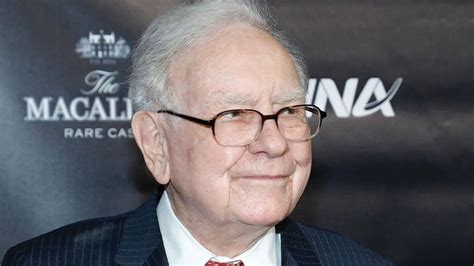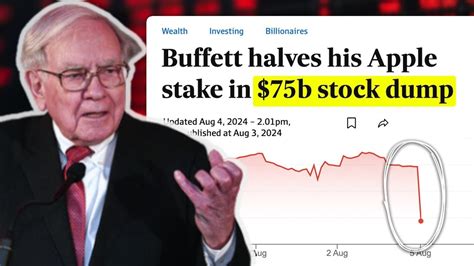
Warren Buffett’s Berkshire Hathaway significantly reduced its holdings in several U.S. stocks during the first quarter of 2024, including a complete exit from Paramount Global and further trimming of its stake in Apple, sparking debate about whether the investment guru is losing faith in his long-held investment philosophies.
Berkshire Hathaway’s recent SEC filings revealed a notable shift in its investment strategy, marked by the complete liquidation of its Paramount Global (PARA) shares and a reduction of its Apple (AAPL) position by 13%, equating to roughly 116 million shares. These moves, along with reductions in other holdings, have prompted analysts to question whether Buffett’s investment approach is evolving in response to changing market dynamics or if it signals a broader shift in his long-term outlook.
The dumping of Paramount Global comes after Buffett previously acknowledged the difficulties of the media business and challenges streaming services face. During Berkshire Hathaway’s annual shareholder meeting on May 4, Buffett stated, “It’s not as easy as I thought it might be.” The full exit from Paramount represents a significant reversal, given Buffett’s previous confidence in the company, which he had once lauded for its content library and strategic positioning.
The reduction in Apple shares, while substantial in number, only represents a single-digit percentage of Berkshire’s total Apple holdings. Apple remains Berkshire’s largest holding, representing approximately 40% of its portfolio. “It is somewhat surprising to see Buffett trim his Apple stake, but this could be due to various reasons, including profit-taking or rebalancing the portfolio,” noted Cathy Seifert, an analyst at CFRA Research. Despite the reduction, Buffett reaffirmed his confidence in Apple, stating at the shareholder meeting that Apple is “an even better business” than American Express and Coca-Cola, two other significant Berkshire holdings. He emphasized, “We will own Apple… unless something dramatic happens that changes capital allocation.”
Beyond Paramount and Apple, Berkshire also reduced its stakes in other companies. The filings revealed smaller reductions in Chevron (CVX) and HP (HPQ). These adjustments, while less dramatic than the Paramount exit or the Apple reduction, contribute to the overall narrative of portfolio repositioning.
These moves have ignited speculation among investors and market observers. Some analysts suggest that Buffett’s actions are a reaction to the current economic climate, characterized by rising interest rates, inflationary pressures, and geopolitical uncertainty. Others believe that the changes reflect a more cautious approach as Buffett prepares for the eventual transition of leadership at Berkshire Hathaway.
Berkshire Hathaway ended the first quarter with a substantial cash pile of $189 billion, nearing a record high. This significant cash reserve could indicate Buffett’s reluctance to deploy capital in the current market environment, suggesting he views current valuations as unattractive or anticipates future investment opportunities arising from market downturns. During the annual meeting, Buffett said, “We only swing at pitches we like,” signaling his disciplined approach to deploying capital and his willingness to remain patient until attractive investment opportunities arise.
The moves are a departure from some of Buffett’s long-held investment principles, which emphasize long-term holding periods and a focus on fundamentally strong companies. The sale of Paramount, in particular, contradicts the “buy and hold” strategy Buffett has often championed.
The significance of these portfolio adjustments cannot be overstated, given Buffett’s iconic status as one of the world’s most successful investors. His investment decisions are closely scrutinized, and any shift in his strategy can have a ripple effect on market sentiment and investor behavior. While Buffett has downplayed the significance of the Apple reduction, emphasizing its continued importance to Berkshire’s portfolio, the combined effect of these moves raises questions about the future direction of Berkshire Hathaway’s investment strategy and the broader implications for the market.
The question remains whether these moves signal a fundamental shift in Buffett’s investment philosophy or simply tactical adjustments in response to specific market conditions. Investors and analysts will continue to closely monitor Berkshire Hathaway’s future filings and statements for clues about the evolving strategies of the Oracle of Omaha.
Detailed Analysis of Berkshire Hathaway’s Q1 2024 Portfolio Adjustments
Berkshire Hathaway’s Q1 2024 SEC filings reveal a series of strategic portfolio adjustments, providing a glimpse into Warren Buffett’s evolving investment outlook. The most notable changes include the complete liquidation of Paramount Global (PARA), a significant reduction in Apple (AAPL) holdings, and smaller adjustments in Chevron (CVX) and HP (HPQ). Each of these moves warrants a detailed examination to understand the underlying motivations and potential implications.
Paramount Global Exit: A Change of Heart
The complete exit from Paramount Global represents a significant reversal of Buffett’s previous confidence in the media conglomerate. Berkshire Hathaway held approximately 63.3 million shares of Paramount Global as of the end of 2023. The decision to liquidate this entire position reflects a change in Buffett’s assessment of the company’s prospects, particularly in the rapidly evolving media landscape.
Buffett’s initial investment in Paramount was based on the belief that the company’s extensive content library, including valuable intellectual property and iconic franchises, would provide a competitive advantage in the streaming era. However, Paramount has faced numerous challenges, including intense competition from larger streaming platforms like Netflix and Disney+, cord-cutting trends that are eroding traditional television viewership, and the high costs associated with producing and acquiring content.
During Berkshire Hathaway’s annual shareholder meeting, Buffett acknowledged the difficulties of the media business. “It’s not as easy as I thought it might be,” he admitted, reflecting on the challenges facing streaming services. This statement suggests that Buffett underestimated the complexity of navigating the streaming landscape and the financial burden of competing with well-capitalized rivals.
The decision to exit Paramount may also be influenced by the company’s financial performance. Paramount has struggled to achieve sustained profitability in its streaming business, Paramount+, and its overall financial results have been inconsistent. The company’s debt load has also been a concern for investors, adding to the pressure on its management team to improve financial performance.
The liquidation of Berkshire’s Paramount shares likely occurred at a loss, given the stock’s underperformance in recent years. This highlights the inherent risks of investing in individual companies, even for seasoned investors like Warren Buffett. It also underscores the importance of continuously reassessing investment theses and being willing to admit mistakes when necessary.
Apple Reduction: Profit-Taking or Portfolio Rebalancing?
The reduction in Apple shares, while substantial in terms of the number of shares sold (approximately 116 million), represents a relatively small percentage (around 13%) of Berkshire Hathaway’s total Apple holdings. Apple remains Berkshire’s largest holding, accounting for approximately 40% of its portfolio. This suggests that Buffett remains bullish on Apple’s long-term prospects, despite the recent reduction.
Several factors may have contributed to the decision to trim the Apple stake. One possibility is profit-taking. Apple’s stock has significantly appreciated in recent years, making it a highly profitable investment for Berkshire Hathaway. Buffett may have decided to take some profits off the table, especially given the company’s large concentration in a single stock.
Another potential explanation is portfolio rebalancing. Berkshire Hathaway’s portfolio may have become overly concentrated in Apple, leading Buffett to reduce the position to diversify the portfolio and reduce risk. As Apple’s stock price has risen, it has become an increasingly dominant part of Berkshire’s holdings, making the portfolio more sensitive to fluctuations in Apple’s stock price.
Buffett has also expressed concerns about the valuation of some technology stocks, including Apple. While he has acknowledged Apple’s strong business fundamentals and its loyal customer base, he may believe that the stock is trading at a premium valuation, leaving less room for future appreciation.
Despite the reduction, Buffett has reaffirmed his confidence in Apple. During the annual shareholder meeting, he described Apple as “an even better business” than American Express and Coca-Cola, two other significant Berkshire holdings. He emphasized that Berkshire will continue to own Apple unless there is a dramatic change in its capital allocation strategy.
Other Portfolio Adjustments: Chevron and HP
In addition to Paramount and Apple, Berkshire Hathaway also made smaller adjustments to its holdings in Chevron (CVX) and HP (HPQ). These reductions, while less dramatic, contribute to the overall narrative of portfolio repositioning.
The reduction in Chevron may reflect a broader shift in Buffett’s views on the energy sector. While Berkshire Hathaway has made significant investments in the oil and gas industry in recent years, including its acquisition of Occidental Petroleum, Buffett may be becoming more cautious about the long-term prospects of fossil fuels in light of the growing focus on renewable energy and climate change.
The reduction in HP may be related to concerns about the company’s growth prospects and its competitive position in the personal computer and printing markets. HP has faced challenges in recent years due to declining PC sales and increased competition from rival manufacturers.
The Significance of Berkshire’s Cash Pile
Berkshire Hathaway ended the first quarter with a substantial cash pile of $189 billion, nearing a record high. This significant cash reserve could indicate Buffett’s reluctance to deploy capital in the current market environment. This reluctance may stem from a perception that current market valuations are too high or from an anticipation of future investment opportunities arising from market downturns.
Buffett has often stated that he prefers to deploy capital when he sees attractive investment opportunities at reasonable prices. In the current market environment, where stock prices have been elevated, he may be finding it difficult to identify companies that meet his investment criteria.
The large cash pile also provides Berkshire Hathaway with significant financial flexibility. It allows the company to weather economic downturns, capitalize on distressed investment opportunities, and make strategic acquisitions when the time is right.
During the annual meeting, Buffett said, “We only swing at pitches we like,” signaling his disciplined approach to deploying capital and his willingness to remain patient until attractive investment opportunities arise. This statement reinforces the idea that Buffett is not pressured to invest capital simply for the sake of investing but rather waits for opportunities that align with his value-oriented investment philosophy.
Implications for Investors
Berkshire Hathaway’s recent portfolio adjustments have significant implications for investors. Buffett’s investment decisions are closely scrutinized, and any shift in his strategy can influence market sentiment and investor behavior.
The sale of Paramount Global serves as a reminder that even the most successful investors make mistakes. It underscores the importance of continuously reassessing investment theses and being willing to admit when an investment is not working out.
The reduction in Apple shares, while not necessarily a sign of bearishness, suggests that investors should be mindful of portfolio concentration and consider diversifying their holdings to reduce risk.
The large cash pile held by Berkshire Hathaway indicates that Buffett is taking a cautious approach to the market. This may be a signal for investors to exercise caution and avoid chasing overvalued stocks.
Future Outlook
The future direction of Berkshire Hathaway’s investment strategy remains uncertain. Buffett is nearing the end of his career, and the company is preparing for the eventual transition of leadership. It is possible that the recent portfolio adjustments reflect a more conservative approach as Buffett prepares to hand over the reins to his successors.
Investors will continue to closely monitor Berkshire Hathaway’s future filings and statements for clues about the evolving strategies of the Oracle of Omaha. The company’s investment decisions will likely continue to influence market sentiment and investor behavior for years to come.
FAQ
1. Why did Warren Buffett sell all of Berkshire Hathaway’s shares of Paramount Global (PARA)?
Warren Buffett sold all of Berkshire Hathaway’s Paramount Global shares because he acknowledged the difficulties and challenges within the media and streaming industry. He stated it wasn’t “as easy as I thought it might be,” reflecting concerns about the company’s ability to compete effectively in the rapidly changing media landscape and achieve sustained profitability in its streaming business. This exit represents a change of heart from his initial investment thesis, likely influenced by Paramount’s financial struggles, debt load, and the intense competition within the streaming market.
2. How much did Berkshire Hathaway reduce its stake in Apple (AAPL)?
Berkshire Hathaway reduced its stake in Apple by approximately 13%, which equates to roughly 116 million shares. Despite this substantial reduction, Apple remains Berkshire’s largest holding, accounting for about 40% of its overall portfolio.
3. What are some possible reasons for Berkshire Hathaway reducing its Apple (AAPL) holdings?
Several reasons could explain the reduction in Apple holdings:
- Profit-Taking: Apple’s stock has significantly appreciated, providing Berkshire with substantial profits. Selling a portion allows them to realize these gains.
- Portfolio Rebalancing: A large concentration in Apple exposes Berkshire to fluctuations in Apple’s stock price. Reducing the position helps diversify the portfolio and manage risk.
- Valuation Concerns: Buffett may believe Apple’s stock is trading at a premium, limiting future appreciation potential.
- Tax Implications: Berkshire may be seeking to offset gains elsewhere with losses to minimize tax liabilities.
4. What does Berkshire Hathaway’s large cash pile of $189 billion signify?
The substantial cash pile of $189 billion signifies several things:
- Market Caution: It suggests Buffett finds current market valuations unattractive and is reluctant to deploy capital in what he perceives as an overvalued environment.
- Anticipation of Opportunities: It indicates an expectation that more attractive investment opportunities may arise in the future, potentially during market downturns.
- Financial Flexibility: It provides Berkshire with the financial flexibility to weather economic downturns, capitalize on distressed assets, and make strategic acquisitions when the timing is favorable.
- Disciplined Approach: It demonstrates Buffett’s disciplined approach to investing, emphasizing patience and waiting for the right opportunities rather than forcing investments in an unsuitable market.
5. What are the potential implications of these portfolio adjustments for other investors?
The implications of Berkshire Hathaway’s portfolio adjustments for other investors include:
- Reassessment of Investment Theses: The Paramount exit serves as a reminder to continuously evaluate investment theses and be willing to acknowledge mistakes.
- Portfolio Diversification: The Apple reduction highlights the importance of diversification to manage risk, avoiding excessive concentration in single stocks.
- Market Caution: The large cash pile suggests a cautious approach to the market, advising investors to be selective and avoid overvalued assets.
- Due Diligence: Encourages investors to conduct thorough research and due diligence before making investment decisions, rather than blindly following trends or perceived wisdom.
- Long-term Perspective: Reinforces the value of a long-term investment horizon, focusing on fundamentally strong companies and avoiding short-term market fluctuations.









